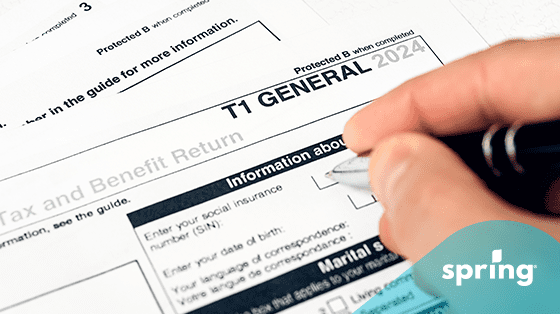A loan co-signer is someone who applies for a loan with you and gives the lender assurance that the loan will be repaid if, for whatever reason, you are unable to make repayments. The co-signer acts as a loan guarantor for the lender, effectively de-risking the loan.
Asking someone to be a co-signer is certainly no small request. The person you ask is taking on a big financial commitment on your behalf since they are legally responsible for paying back your loan if necessary. That’s why it is important to think carefully about who you plan to approach as a potential consigner, and the best way to go about having that conversation.
Why Some People Need a Co-Signer
Lenders look at all sorts of variables to determine if you qualify for a loan, though credit score and income are the most important factors in making the decision. If neither of these factors meet the lender’s criteria, he or she may ask you to find a co-signer. Here’s why credit score and income are critical to your application.
Credit Score
Your credit rating, or credit score, is determined by several factors, credit utilization, credit history, inquiries, and public records, but by far the most important factor is your payment history. Lenders want to know how much risk you pose. If your history says you’ve experienced challenges repaying past loans or other forms of credit, you will be deemed a high risk of not repaying the loan. And if you have bad credit, there’s a good chance that you’ll be asked to add a guarantor to the car loan.
However, your income and existing debt load might negate the need for a co-signer…
Income
What’s important to know about income is that lenders need to see a steady supply of it to feel confident a loan can be repaid within an agreed-upon timeline. Lenders will usually apply a debt-to-income calculation to determine your eligibility. The formula basically calculates how much of your total income goes toward all your debt obligations. If you are overleveraged (already deep in debt), then securing further credit will be a challenge and you will need to find a co-signer.
What Makes a Good Co-Signer?
As we mentioned, being a loan co-signer is no small responsibility. A co-signer takes on a big commitment financially and places a great deal of trust in you. That’s why you need to be thoughtful in who you ask.
Family members are usually the first choice because they are the most invested in your success. Hopefully, they would be willing to help you in a time of financial need and perhaps even forgiving if there’s any roadblock in your ability to make repayments.
However, don’t think about asking Uncle Bob just because he’s super-nice to you at Thanksgiving. Be sure the family member you approach has sufficient income to absorb your loan agreement should anything go wrong. Also, Bob needs to have a solid credit rating too (generally over 650). Whoever you ask, be sure to factor in their financial footing before having this conversation. They will need to be able to absorb your loan payments if you can’t make them yourself for some reason.
Close friends could be another option, but again they need to have a sound financial situation and willing to absorb your loan if necessary. Let’s be honest – not many friends can go out on a financial limb like that. Plus, having the conversation alone might put an irreparable dent in your friendship.
How to Convince a Co-Signer
Before you have that difficult conversation of asking a co-signer for help, there are a few things you can do to prepare and further bolster your case. Come to the conversation prepared and determined to show that you want to be taken seriously. You need to convince the co-signer to put faith in you.
- Come prepared with details and information, so the consigner feels confident in you.
- Be honest and transparent about your financial history. Give them the benefit of walking into the loan application meeting with all the facts. They don’t want a surprise in this situation.
- Outline your understanding of how a loan works and your commitment to pay it back. Do the research if needed and show that you understand debt-to-income ratios, compound interest rates and repayment schedules. This will go a long way to making your co-signer feel confident in helping you.
- If you have a bad credit history or no credit history, communicate how paying back a loan will help you build your credit rating.
- Lastly, let them know you’re serious and take their finances just as seriously. Tell them you will reward their trust (by making repayments on time).
Considerations for the Co-Signer
As we said, being completely transparent with your potential co-signer is the smartest way to approach them. Make sure they understand the risk involved and have all the details and information so that they can make a clear-headed decision.
Be sure they know that any repayments you fail to make will fall to them. They are ultimately responsible for the loan and if you start falling short, it will be on them to pick up the slack. Also, make them understand that being a co-signer will affect their ability to borrow credit themselves. If a lender sees they have a cosigned loan, it will influence the lender’s decision as to whether the borrower can handle any more credit.
Finally, if the co-signer is unable to make payments, in the event that you can’t, it will damage their credit rating, as well as yours. This will affect future borrowing and put the co-signer into financial trouble.
What if I Can’t Find a Co-Signer?
If you can’t find a co-signer, don’t feel bad. It’s not easy to do. Most people cannot handle the risk and are already working hard to service their own debt obligations. Try not to take it personally if they say no.
But you do have options. If you’re having trouble finding a co-signer, put the plan on hold while you build up your credit. Talk to a representative at Spring Financial about smaller loan possibilities or our signature credit builder program. There are multiple ways to rebuild credit, and Spring Financial works with all kinds of credit backgrounds. Get in touch today!








